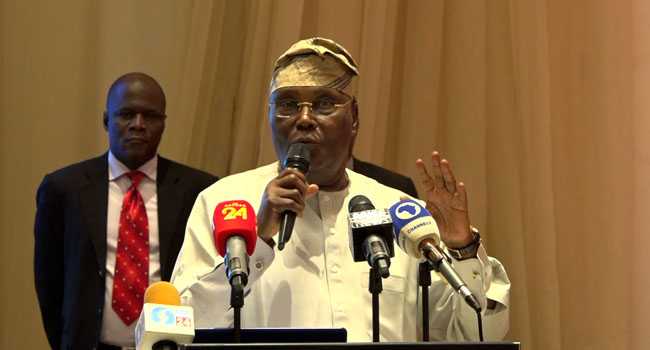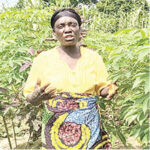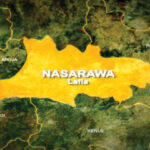By Michael Abimboye
“I’m not a messiah. I do not promise Eldorado or $1 = N1, but I always ask that we should look at the economic progress we made under my leadership and what I am doing in private business and judge me by those. As VP, I assembled what is arguably the best economic team ever in Nigeria. It was made up of young, world-class professionals, who came home to work. Some of those professionals are now political leaders, governors and world leaders in their own right.” -Atiku Abubakar, GCON.
That is not an empty boast. The records bear him out. And as we inch closer to the 2023 presidential election, it will be better for Nigerians to reflect and bring back to power those who have managed the country’s economy well in the recent past to come and mitigate the disaster the ruling All Progressives Congress has inflicted on the nation in the past seven years.
When the Peoples’ Democratic Party, PDP, took over government in 1999, the task was obvious as the economy had been battered under the previous military governments. In the administration’s first four years, oil prices hovered between $16 and $28 per barrel. National debt (both local and foreign) had ballooned precariously. The country’s foreign reserve had been depleted. The nation was getting to the dangerous precipice.
But the duo of President Olusegun Obasanjo and Vice President Atiku Abubakar knew they must turn the tide for the better. As head of the Economic Management Team, the onus fell on Atiku to chat the way out of the mess. What did he do? Atiku searched for and brought the best brains, in and outside Nigeria, to constitute a solid economic team for the fledgling administration. Relentlessly, each of them contributed their quota to the revival efforts of the new government.
Twenty-three years after the miracle, Atiku recollects vividly: “I went to the World Bank and met a bright lady, convinced her to come back home, and she became a star in our government.”
That star was Dr. Ngozi Okonjo-Iweala, an economics guru who served as Finance Minister. Under her, the government achieved economic stability. Nigeria exited the Paris Club and London Club debt trap. It got debt relief and the country began a journey to prosperity. “We managed to pay up salary arrears from decades back, clear up our national debts and build up foreign reserves. Our Gross Domestic Product grew at the fastest rate we’ve seen since the return to democracy,” Atiku recalls.
Since these historic feats, and Atiku’s exit from government, no other leader has equaled his record. Even when a successor administration recalled Okonjo-Iweala to serve as finance minister, it could not repeat the magic. “To show you we had effective leadership, the same lady could not replicate her exploits under a different government,” Atiku reminisced.
Against this background of economic wizardry, one wonders why Nigerians should hesitate to bring back Atiku to help mend the broken land. Since his party, the PDP, began the current campaigns, the former VP but now its flagbearer, has continued to appeal to reason why he should be voted for as Nigeria’s next president.
He is selling a 5-point agenda which encompasses restoration of Nigeria’s unity, strengthening of national security, fostering economic prosperity, improvement of education delivery and re-structuring of the polity.
At campaign rallies usually attended by hundreds of thousands of supporters of the voters, Atiku is never tired of restating his resolve to revive the economy. For instance, at the Wednesday December 7, 2022 rally in Osogbo, capital of Osun State, the people of the State of the Living Spring who are still in celebratory mood following the inauguration of Nurudeen Jackson Ademola Adeleke as their governor ten days earlier (November 27), trooped out to receive the economic prosperity message of the PDP presidential candidate and his running mate, Governor Ifeanyi Okowa and other senior party members. And they lived up to their billings. Atiku who noted that since the All Progressives Congress, APC, came to power in 2015, Nigerians have been suffering from bad governance, said he is contesting the election to restore Nigeria.
His words: “If we are voted into office, we will stabilize Nigeria, unite its people, ensure security of lives and property and make sure our people benefit from the good governance of the PDP.
“We have done it before, we have got the experience. We have got the people who have the capacity to bring about changes; we are not new as far as governance is concerned in Nigeria.”
An ecstatic Adeleke, Osun State’s new helmsman, noted: “If Atiku Abubakar becomes the President of Nigeria in 2023, Nigeria is sure to develop and prosper.
“Atiku will restore the economy, security, agriculture, education and health; he will ensure that the nation is united. Atiku is an experienced man and the only candidate that can rescue Nigeria from its various problems and challenges.
“Under Atiku as Vice-President, Nigeria was the largest economy in Africa. Atiku will direct Nigeria to the path of development. He will restore the rule of law and due process. Atiku will secure the nation.”
On his part, Governor Okowa and PDP’s Vice-Presidential candidate urged the people to “vote for Atiku Abubakar as he is the only person that can rescue Nigeria from its economic woes.”
When he was hosted by the Lagos Chamber of Commerce and Industry, LCCI, the grandmaster of the economy said he has a three-prong approach to Nigeria’s economic recovery: re-affirming the criticality of private-sector leadership and greater sector participation in development; repositioning the public sector to focus on its core responsibility of facilitation; and enabling the appropriate legal and regulatory framework for rapid economic and social development. The essence of these, according to him, is to create economic opportunities for Nigerians. “Creating economic opportunities for Nigerians will represent significant implication for social cohesion and national security. Increased jobs and income opportunities will reduce the likelihood of our youth being involved in crime, violence and conflict motivated by manipulating religious or ethnic differences,” he told the gathering.
Atiku expatiated on his grand plan. He said there are seven strategic steps he will take to effect Nigeria’s economic development agenda if he wins the February 25, 2023 contest: reforms to reposition private sector, investing to increase stock and improve the quality of infrastructure, putting in place policies and measures to optimize the growth potential of real sectors and MSMEs, harnessing the potential of the new economy, policies and measures to expand the export base, increasing foreign direct investment flows into non-oil sector and optimizing the fiscal space to generate more revenues for development.
“We cannot overcome our economic challenges without significant reforms to re-structure the economy and to support the private sector to unleash its growth potential and play a key role in the economy. A strong, productive, and pro-growth private sector is needed to create wealth, generate employment opportunities, and help fight poverty,” he said.
In his quest to liberate Nigerians, Atiku promised to accord pride of place and listen more to the private sector as well as fashion out a clear and consistent economic policy for Nigeria. His words on all these areas:
“Understanding the private sector and securing their buy-in when policies are designed will determine the success of our economic growth and development agenda. Through regular dialogue with the private sector, we will build consensus, improve trust between us and make new reform initiatives easier to implement and sustainable.
“There will be more clarity, coherence, and consistency in policy. Nothing could be more threatening to investment flows than an environment that is full of policy flip-flops.
“Our monetary and fiscal authorities will be better coordinated and shall ensure a stable macro-economic environment with low inflation, stable exchange rate and interest rates that will be supportive of businesses’ quest for credit.
“We will allow CBN the independence to pursue its mandate but ensure that such policies are not detrimental to Nigeria’s quest for FDI and to Nigeria’s long-term growth. For example, we will push for a foreign exchange policy that encourages capital inflows and makes capital outflows less attractive to the investors.
“Our administration will consider declaring a state of emergency in the Power Sector to underscore our concerns about the state of affairs in the sector.”
On the epileptic power system, Atiku said that “As a short-term measure to ensure enhanced supply within the first year of the new administration, I shall initiate and implement an Emergency Power Programme (EPPs) that can deliver additional capacity in certain key areas.
“Over the medium term, I will then go on to propose a legislation for the removal of the entire electricity value chain from the exclusive list and give states the power to generate, transmit and distribute electricity for themselves.
More importantly, he has marshalled a policy aimed at achieving greater coordination of investments in the entire electricity value chain.
He said investments in additional generation capacity are futile without consideration for the complementary transmission and distribution infrastructure to wheel the additional energy.
“Ahead of procuring additional generation, both transmission and distribution capacities would be enhanced with private sector support for investments. In this regard, we shall incentivize private investors to invest in the development of multiple green-field mini-grid transmission systems to be looped into the super-grid in the medium to long term while allowing the FG focus on policy, regulation, and standardization,” he said.
On infrastructural development, Atiku said the current “government is driving key infrastructural programmes with very limited private sector participation. In the face of dwindling public revenues and given the quantum of resources required to bridge the financing deficit, this is neither feasible nor sustainable.
“We shall incentivize, with regulation and tax incentives, a consortium of private sector institutions to establish an Infrastructure Debt Fund (IDF) with an initial carrying capacity of US$20 billion. This will be for the financing and delivery of large infrastructure projects across all sectors of the economy,” he said.
Also, he promised to establish an Infrastructure Development Unit, IDU, in the Presidency, with a coordinating function and a specific mandate of working with the MDAs to fast track and drive the process of infrastructure development in the country.
Atiku is cock sure of his grand plan. “Within the first 100 days in office, I will create an Economic Stimulus Fund with an initial investment capacity of approximately US$10 billion to prioritize support to MSMEs across all the economic sectors, as they offer the greatest opportunities for achieving inclusive growth,” he said.
The PDP candidate is worried by hunger that is ravaging the land. He argued that today, millions of Nigerians go to bed hungry every day. He said Nigeria must feed Nigerians and promised to pursue an aggressive and innovative food production policy that will strongly boost farmers’ access to farm inputs.
“We will put farmers first. My government will ensure transparency in the access of farmers to seeds, fertilizers and farm machinery, as well as processing equipment to boost food production and bring down food price inflation, he revealed.
And he added: “My government will strongly promote private sector investments in agriculture, from seeds to fertilizers, farm chemicals, farm machinery to expand our competitiveness in national, regional and global markets, for commodities in which Nigeria has comparative advantage.
“We will support agro-industrial development for major food crops, livestock, fisheries, and invest heavily in irrigation and climate resilient agricultural systems. We will add value to all of what we produce.”
Atiku’s economic grand plan is inexhaustible in one write up. We are, however, sure that once he wins next February, Nigerians will be in for a good deal. As Dr Tunde Olusunle noted recently, “Atiku Abubakar holds the promise, the key for the healing, comforting, soothing, rediscovery and resetting that Nigeria urgently and earnestly needs.”

 Join Daily Trust WhatsApp Community For Quick Access To News and Happenings Around You.
Join Daily Trust WhatsApp Community For Quick Access To News and Happenings Around You.

